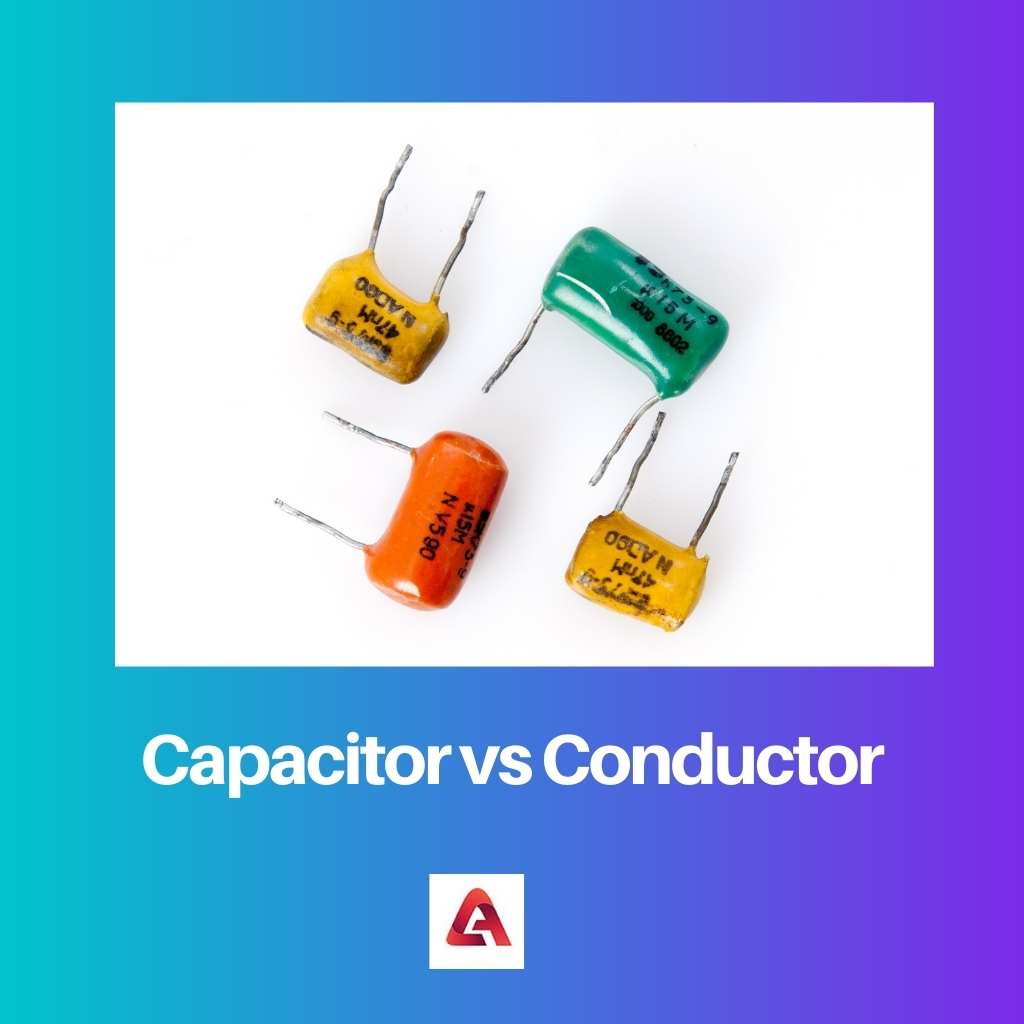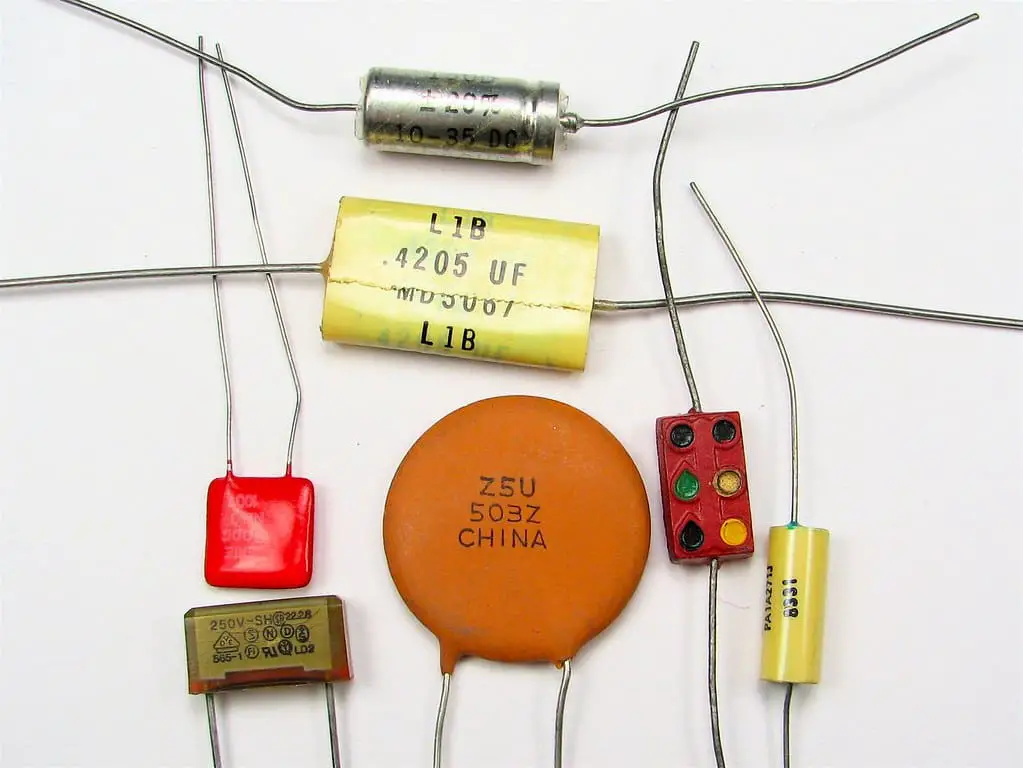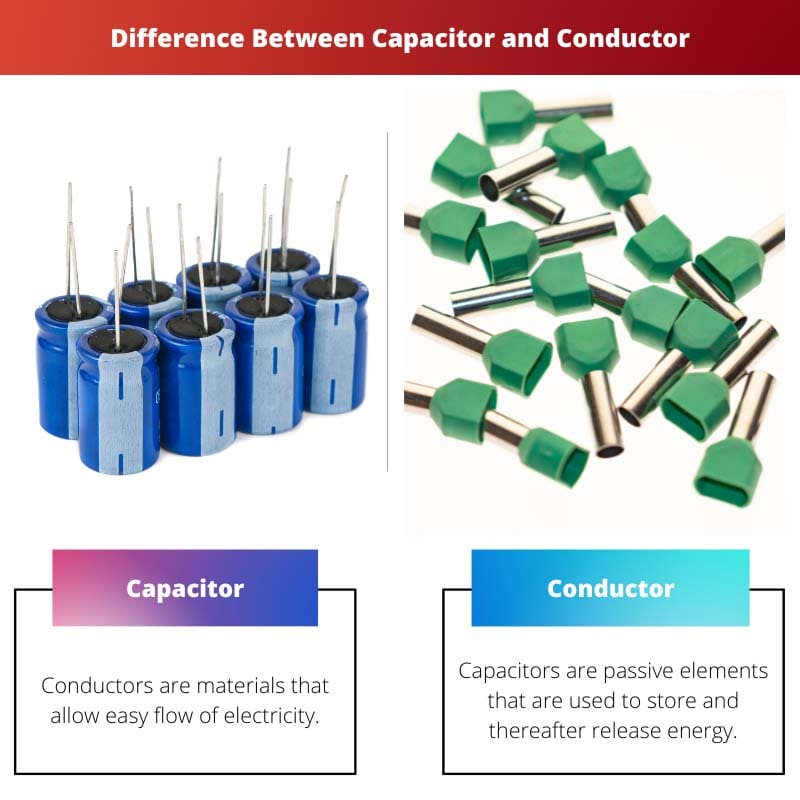Conductors and capacitors are both electronic devices while the conductor is not by itself an electric element and capacitors are the passive elements in a circuit.
Capacitors are capable of storing energy. Conductors being electrical substances carries an electrical charge of electrons.
These electrons move easily from one atom to another. In simple words, conductors are material that comprises movable electric charge and capacitors are electronic devices used to store energy.
Key Takeaways
- Capacitors store electrical energy in an electric field, while conductors facilitate the flow of electric current.
- Capacitors block direct current (DC) and allow alternating current (AC) to pass through.
- Conductors have low resistance, enabling efficient electrical conduction.
Capacitor vs Conductor
The difference between conductor and capacitor is their uses. While conductor is used to conducting electricity capacitors are used to store energy. The conductor allows energy to flow through it while the capacitor allows its storage and supplying such energy to circuits. The function of the capacitor is to store and release energy. The function of a conductor is to allow heat electricity or sound to flow through it.

Conductors allow electricity to flow through them. They are capable of conducting electricity because they allow electrons to move easily.
Electrons move atom to atom and generate electricity. There are several day-to-day items that are conductors of electricity like silver, gold, copper, iron, steel, etc.
Capacitors are electronic devices that store energy in form of electrostatic charges. A capacitor is an indispensable part of any electronic device. It can be said as a small rechargeable battery.
It is used along with an electronic circuit. There are different types of capacitors like mica capacitor, film capacitor, paper capacitor, non-polarized capacitor. The different types are bifurcated based on different applications.
Comparison Table
| Parameters of comparison | Conductor | Capacitor |
|---|---|---|
| Definition | Conductors are materials that allow easy flow of electricity | Capacitors are passive elements that are used to store and thereafter release energy |
| Types | Conductors are mainly of four types good conductors, semiconductors, resistors, and non-conductors. | Capacitors are of six different types namely Electrolytic capacitor, Mica capacitor, paper capacitor, film capacitor, non-polarized capacitor, and ceramic capacitor. |
| Use | Allows electricity to pass | Stores and passes energy |
| Function | Carriage of electricity | Storage of electricity |
What is Conductor?
Conductors are materials that carry electrons and lightly attached atoms. When electricity passes, the electrons get charged and it vibrates at its place.
The vibration then transfers the charge from one electron to another. Conductors allow electrons to move with zero resistance.
Good conductors are ones that have electrons loosely attached and atoms move freely. Metal is a good conductor and hence electricity passes through metal easily.
Bad conductors or insulators are materials that do not allow the electric current to pass. The electrons in such a case are tightly bound.
Resistors are also one of the types of conductors. These are small electronic devices that reduce electric currents. Here the electric current flow in a controlled manner.
Resistors are used where the excess supply of electricity might cause damage. Hence to control the amount of electricity. resistors are used.
Semiconductors are conductors which may be called a material that is between good conduct and insulators. Semiconductors are nonmetals.
These days all electronics devices use an electrical device to use semiconductors to flow control the flow of currents.
What is Capacitor?
Capacitors are commonly used in electronic devices in modern circuits. Capacitors are one of the oldest electronic components used in devices.
Capacitors are responsible for storing electricity. They store the energy and pass it on to circuits. Capacitors are used in modern devices such as large computers.
The electric energy is stored in capacitors at times of power failure. This electric energy helps maintain information that might get lost due to temporary power failure.
The capacitors have been called chargeable mini batteries. The main difference between batteries and capacitors is that they have different methods to store energy.
The energy stored in capacitors is electric potential energy. Capacitors have a life span of 20 years almost and may even be limited than that. There are some capacitors that have high capacity.
They are commonly known as ultracapacitors or supercapacitors. These capacitors have lower voltage limits.The high capacity enables enough stress and the voltage limit is reduced.
A basic design of capacitors contains two parallel conductors. As voltage source is attached to capacitors the capacitor plate gets charged. The plate shall get negatively charged.
There are different types of capacitors
Film capacitors are the capacitors that use plastic film as a medium. Ceramic conductors use ceramic as a dielectric. Electrolytic capacitors are the materials that use oxide layers as a medium and variable capacitors use air for the medium.

Main Differences Between Capacitor and Conductor
- The very main difference between capacitors and conductors is the function they both perform. Capacitors are used for the storage of energy and passing the stored energy to circuits. Conductors are materials used to allow the energy to pass through them.
- Conductors are not able to store energy and hence the difference arises in their different use in a particular electronic device. Capacitors use two parallel conductors while conductors do not use capacitors in any way.
- Both of the materials have different applications while conductors are used as mercury in thermometer which is used to test the temperature of the human body, capacitors have been used in power conditioning signal coupling and decoupling. The most common of which remains energy storage.
- Capacitors are being used in radio and telecommunications widely throughout the history of electronic devices. While conductors are common materials that are being used in day-to-day life. The most common use can be cooking utensils. The utensils get heated up since they’re are good conductors and food can be prepared quickly.
- Conductors are not able to store energy and just allow the flow of energy while capacitors as a battery. Capacitors consist of conductors while conductors can be used independently

- https://iopscience.iop.org/article/10.1088/0950-7671/44/6/309/meta
- https://link.springer.com/chapter/10.1007/978-3-030-43009-2_1
- https://www.sciencedirect.com/science/article/pii/0375960193911939
- https://ieeexplore.ieee.org/abstract/document/911139/
